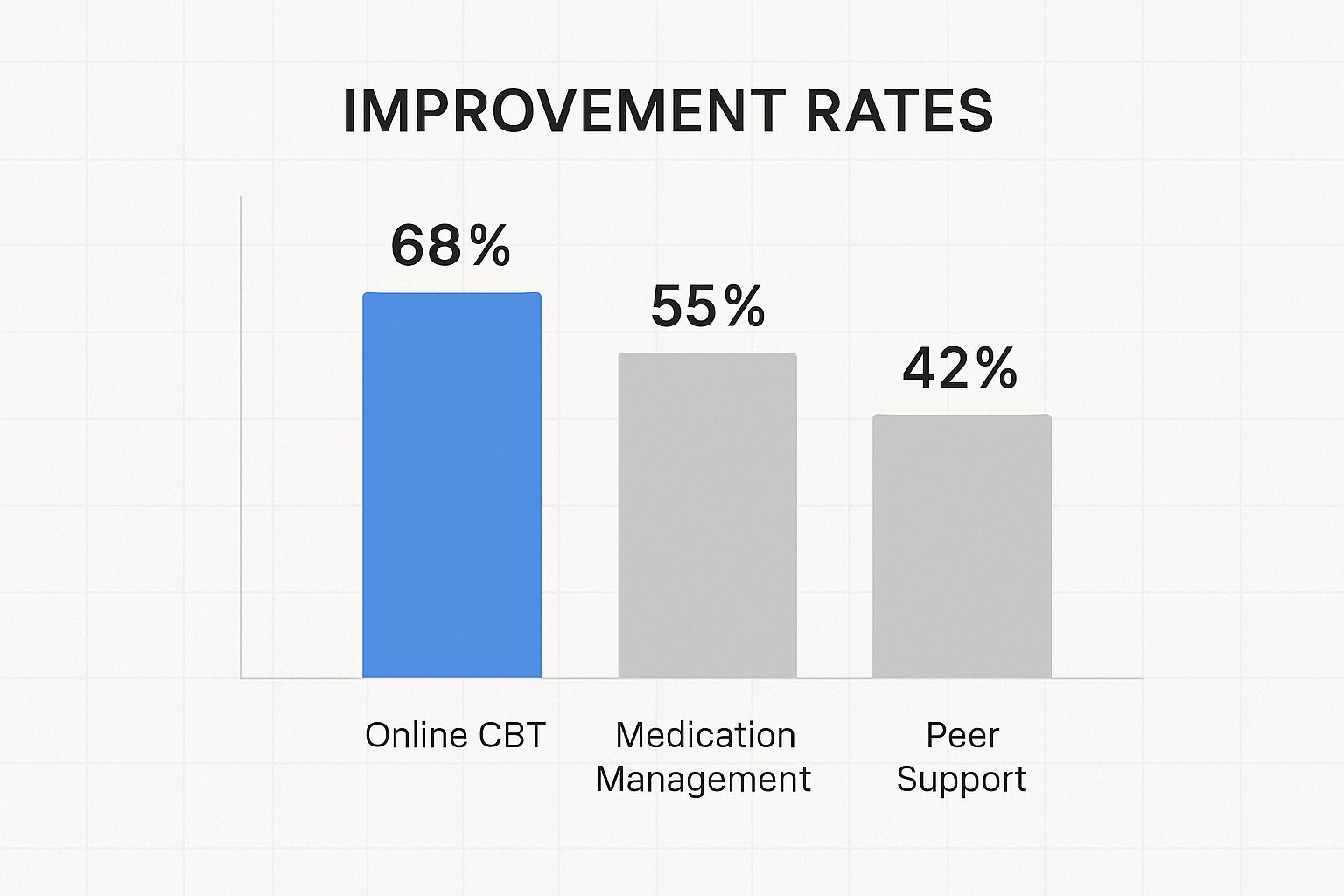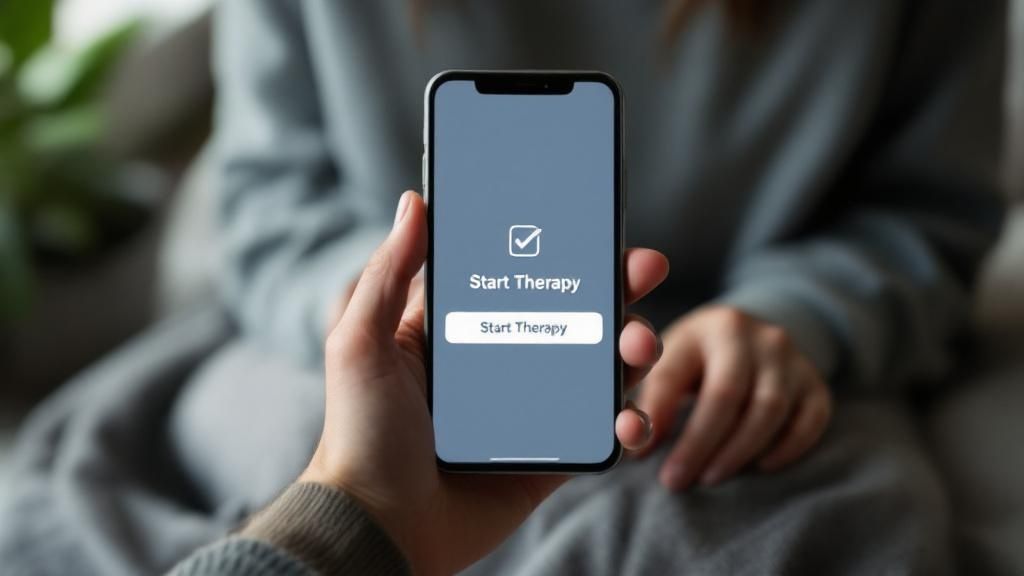Feeling overwhelmed is a natural part of life, but you don't have to navigate it alone. Exploring depression treatment online is a courageous first step toward feeling better, offering professional support in a space where you feel safe and comfortable.
Finding Support from the Comfort of Your Home
Taking the first step toward mental well-being requires courage, and it's a journey where you deserve to feel supported. Life's challenges, like workplace stress, burnout, or persistent feelings of sadness and anxiety, can feel isolating. Simply acknowledging these feelings is an act of self-awareness.
Fortunately, technology makes getting professional help more accessible than ever. Online therapy provides a confidential space to explore your thoughts and feelings with a trained professional, right from your home. This removes practical barriers like travel and scheduling, allowing you to focus on your well-being.
A Path Toward Resilience and Well-Being
Online counselling is about more than managing difficult moments; it's about building a stronger, more resilient you. The process focuses on developing practical skills to navigate life's ups and downs with greater confidence. It's a journey toward rediscovering a sense of purpose and joy.
Therapists often draw from positive psychology to help you focus on your strengths, cultivate resilience, and foster happiness. You might learn skills like self-compassion or mindfulness, which are tools for lasting well-being.
"The curious paradox is that when I accept myself just as I am, then I can change." – Carl Rogers
This quote captures the essence of healing: it begins with self-acceptance. Therapy offers a judgment-free space to explore who you are, fostering the self-compassion needed for growth and helping you understand that your struggles don't define you.
What to Expect from This Guide
This guide will walk you through the world of online depression treatment in a clear, straightforward way. We'll cover what online therapy looks like, the types of services available, and how to find a professional who feels right for you. Our goal is to empower you to make an informed choice for your mental health.
We will explore these key areas:
- Understanding Online Therapy: What is it, and how does it help with challenges like anxiety and depression?
- Building Resilience: Practical ways to cope with workplace stress and other life challenges.
- The Role of Assessments: How certain tools offer useful insights, remembering they are informational, not diagnostic.
- Finding Your Path: How to choose a therapist and begin your journey toward greater happiness and balance.
Think of this guide as a supportive companion on your path to well-being. It's designed to give you the knowledge and confidence to take a meaningful step toward a healthier life.
What Online Depression Treatment Really Means

So, what does depression treatment online actually involve? It means having professional mental health support that fits into your life, whether you're at home, at work, or traveling.
This approach removes the hassle of travel and waiting rooms, creating a direct, private connection to a qualified therapist through your device. This is structured, professional counselling designed to help you address real challenges. Whether it's a low mood, feelings of anxiety, or workplace stress, online therapy offers a dedicated space to learn practical coping skills with an expert's guidance.
The Core of Online Counselling
At its heart, online therapy is a partnership built on a trusting relationship with your counsellor. Together, you can explore thought and behavior patterns that may contribute to feelings of depression.
The process is collaborative and tailored to you. A therapist might use methods like Cognitive Behavioural Therapy (CBT) to help reframe unhelpful thoughts or teach mindfulness to manage stress. The goal is to equip you with tools to enhance your overall well-being and build lasting resilience.
Online therapy offers more than just a listening ear; it provides a structured framework for personal growth, helping you build self-compassion and develop the strength to navigate life's challenges with greater confidence.
This framework supports sustainable change by helping you understand the connections between your thoughts, feelings, and actions. This empowers you to make conscious choices that lead to a healthier, more fulfilling life.
Making Support Accessible in India
Online therapy is transforming accessibility, especially in India, where an estimated 56 million people are affected by depression. Digital platforms bridge this gap by offering a convenient and often more affordable alternative to traditional therapy. You can learn more about the role of online therapy in India and its growing impact.
Online therapy effectively removes common barriers to getting help:
- Geographical Distance: Connect with a skilled therapist from anywhere, whether in a major city or a remote town.
- Scheduling Conflicts: Flexible scheduling, including evenings and weekends, accommodates busy lives.
- Privacy and Comfort: Discussing personal matters from a safe space can make it easier to open up and reduce stigma.
Building Resilience and Well-Being
The journey of online therapy is not just about managing challenges; it’s about actively cultivating positive mental health. This means shifting focus from merely surviving to truly thriving. A key part of this is developing resilience—the ability to bounce back from life's difficulties.
Your therapist can help you recognize your strengths and values, fostering self-compassion and teaching you to be kind to yourself. This process lays a foundation for long-term emotional well-being and a life filled with meaning. It's important to remember that any online assessments are informational tools to start a conversation, not a substitute for a professional diagnosis.
Exploring Different Online Therapy Formats
Online therapy offers a range of approaches designed to fit your needs and comfort level. The goal is to find a communication style that feels natural and allows you to be open with your therapist.
For some, the direct connection of a video call feels most like traditional therapy. For others who experience anxiety with live conversation, text-based therapy provides space to reflect and write. Let's explore these formats.
Comparing Online Therapy Formats
Choosing the right format can significantly impact your experience. Here’s a comparison of common online therapy methods to help you decide what works best for you.
| Therapy Format | How It Works | Best For | Considerations |
|---|---|---|---|
| Live Video/Voice Calls | Scheduled, real-time sessions with a therapist via secure video or voice chat. It’s a direct, face-to-face conversation. | Building a strong therapist relationship, picking up on non-verbal cues, and having a structured, dedicated appointment time. | Requires a private space and a stable internet connection. Can feel intense for those anxious about live interaction. |
| Text & Messaging Therapy | You send messages (text, audio, or video clips) to your therapist anytime. They reply at scheduled times. It's asynchronous. | People with busy schedules, those who express themselves better in writing, or anyone needing ongoing, in-the-moment support. | Lacks the immediacy of a live chat and misses non-verbal cues. The connection can feel less personal for some. |
Ultimately, there is no single "best" format—only the one that is best for you. Your choice shapes your interaction, so consider what would make you feel most supported.
The Therapeutic Techniques Behind the Screen
The format is the how, but the therapeutic technique is the what. Online therapists use the same evidence-based methods as in-person clinicians to help you navigate depression and anxiety.
One of the most widely used methods is Cognitive Behavioural Therapy (CBT). CBT helps you identify, challenge, and change unhelpful thought patterns and behaviors. For example, you might work with your therapist to reframe an automatic negative thought into a more constructive one.
Evidence shows these structured online methods deliver real results.

As you can see, structured therapy like online CBT often leads to significant improvements for people seeking support.
Therapists also integrate other powerful techniques during online counselling, including:
- Mindfulness-Based Practices: These teach you to stay in the present moment without judgment, such as through guided breathing exercises.
- Psychodynamic Therapy: This approach explores how past experiences may shape your present feelings, leading to self-awareness.
- Positive Psychology Interventions: This technique focuses on building your strengths and practicing gratitude to cultivate resilience.
A quick reminder: any assessments your therapist uses are informational tools to guide your sessions. They are not a formal diagnosis but a compass to point you in the right direction.
The Rise of Digital Mental Health Support

The conversation around mental health in India is changing for the better as stigma fades. More people now recognize that caring for emotional well-being is a sign of strength.
Technology has been a major driver of this shift, breaking down barriers that made professional help feel out of reach. With online platforms, a meaningful conversation with a qualified therapist is now just a click away. Choosing depression treatment online is a modern, practical way to invest in yourself.
Overcoming Traditional Barriers with Technology
For years, accessing mental health support involved overcoming many obstacles. Finding a nearby therapist, scheduling appointments, and managing social anxiety were common challenges.
Online therapy eliminates these problems. It allows you to connect with a professional from your own space, making it easier to attend sessions consistently. This convenience lets you focus on what truly matters: your healing journey.
Online therapy creates a bridge to support, ensuring that compassionate, professional care is available to anyone, regardless of their location or circumstances. It democratises access to well-being.
This accessibility is especially helpful when dealing with depression or anxiety, as it brings support directly to you. This makes taking that crucial first step feel much more manageable.
A Growing Acceptance and a Strong Legal Framework
The shift to digital mental healthcare is supported by a strong foundation. The online mental health market in India was valued at USD 133.47 million and is expected to reach USD 451.73 million by 2033, showing a growing demand for accessible teletherapy.
India's Mental Healthcare Act, 2017, gives every person the right to access mental healthcare with dignity. This legislation gives online therapy legitimacy, assuring you receive recognized, professional support. This blend of social acceptance and legal backing confirms that online counselling is an effective path for managing workplace stress or building emotional resilience. Technologies like voice software in healthcare are also improving support services behind the scenes.
Empowering You on Your Journey
Ultimately, the rise of digital mental health is about putting you in control. It empowers you to find a therapist and therapy style that fits your life, where you can focus on building positive habits like managing stress and cultivating self-compassion.
Remember that online assessments are conversation starters, providing initial insights to discuss with a professional. They are not a formal diagnosis. Real, effective help is closer than ever, and choosing online support is a powerful step toward a healthier, more balanced life.
How to Choose the Right Online Therapist

Finding a therapist you connect with is one of the most important parts of your therapy journey. This therapeutic relationship creates a safe space to open up and begin healing. A good online counsellor brings expertise, empathy, and understanding to your sessions.
This connection is vital for successful depression treatment online. When you feel seen and heard, you are more likely to build the trust needed for real progress. Choosing a therapist is a personal decision, so take your time to find someone who feels right for you.
Look for the Right Qualifications and Specialisations
First, ensure your therapist is properly qualified with credentials like a Master’s degree in psychology or social work. Reputable platforms like DeTalks simplify this by vetting all therapists in their network.
Consider their specializations. Finding a professional with experience in what you're facing—whether it's depression, anxiety, or workplace stress—can make a significant difference. Reading their profiles can help you see if their expertise aligns with your needs.
Understanding Their Therapeutic Approach
Every therapist has a unique style or therapeutic approach. Some use Cognitive Behavioural Therapy (CBT) to reframe thoughts, while others use mindfulness to build resilience. The most important thing is finding an approach that resonates with you.
Think about what you hope to achieve in your sessions. Are you looking for practical strategies or a deeper exploration of your past? Answering this will help you find a therapist whose methods align with your goals for improving your well-being.
The goal isn’t to find a perfect therapist, but to find a therapist who is perfect for you—someone whose approach makes you feel supported, understood, and hopeful about the journey ahead.
This mindset transforms the search from a task into an empowering choice. You are selecting a partner for your mental health journey.
Use the Initial Consultation Wisely
Most platforms offer an initial consultation, which is a great opportunity to see if a therapist is a good fit. Use this low-pressure meeting to ask questions and get a feel for their communication style.
Here are a few questions you might ask:
- What is your experience helping people with challenges like mine?
- Could you explain your therapeutic approach in simple terms?
- What can I expect in our first few sessions together?
It's okay if the first person you speak with isn't the right one. Trust your intuition. Finding the right therapeutic relationship is a crucial step toward building resilience and finding a path to greater self-compassion and happiness. Remember, assessments are for guidance, not diagnosis.
Your Next Steps Toward a Healthier Mind
Taking the first step is a powerful act of self-care. Choosing depression treatment online is a courageous decision to prioritize your well-being.
The path to feeling better is personal, and the goal is not an overnight fix. It’s about gradually building skills to support your long-term mental health. Online therapy offers a supportive space to learn and practice these skills at your own pace.
Embracing a Path of Self-Compassion
As you begin, remember to be kind to yourself. Progress isn't always linear, and some days will be harder than others.
Celebrate small wins, like showing up for a session or trying a new coping technique. These moments are the building blocks of resilience. Online counselling provides a non-judgmental space to explore your feelings and understand that struggling with anxiety or workplace stress is part of being human.
True well-being comes not from the absence of problems, but from the confidence that you have the tools to handle them. Online therapy is about empowering you with those very tools.
This sense of empowerment is at the core of therapy. It helps shift your perspective from feeling overwhelmed to feeling capable and ready to navigate life's challenges.
The Growing Accessibility of Online Support
If you're considering online support, you are not alone. In India, technology has made seeking mental health help more accessible and accepted than ever.
One survey showed that about 61% of female and 55% of male respondents have used digital wellness tools. You can learn more about technology's role in mental health statistics to see how it's improving access to support. This growing acceptance means quality care is within reach for many. Platforms like DeTalks offer a safe starting point to browse professionals and find someone you connect with.
Remember, any initial questionnaires or assessments are simply tools to start the conversation, not a final diagnosis. Taking this step is an act of hope and an investment in your happiness and a more resilient life.
Frequently Asked Questions About Online Therapy
It's normal to have questions when considering online therapy. You're taking an important step, and you deserve to feel clear about how it works. Here are answers to some common queries to help you feel more empowered.
Is Online Therapy as Effective as In-Person Therapy?
Yes, for many people, research shows that online therapy is just as effective as in-person sessions, especially for mild to moderate depression and anxiety.
Therapeutic methods like Cognitive Behavioural Therapy (CBT) translate well to a digital format. The success of counselling depends on your connection with the therapist, which is entirely possible to build online. For more answers, you can check out Buddypro's FAQ section.
How Is My Privacy Protected in Online Counselling?
Reputable platforms use bank-level encryption and secure technology to ensure your conversations remain confidential. Therapists are also bound by the same strict professional codes of confidentiality as in a physical office.
To protect your privacy, find a quiet space for your sessions where you won't be interrupted.
Choosing a platform that is upfront and transparent about its privacy policies is crucial. It lets you relax and focus on what truly matters: your journey toward building resilience and self-compassion, without a second thought about your data.
What Should I Expect from My First Session?
Your first session is a low-pressure conversation for you and your therapist to get to know each other. You'll discuss what brought you to therapy, the challenges you're facing (like workplace stress), and your goals.
Your therapist will ask about your background to better understand your situation. This is also your time to ask them questions and see if their approach feels like a good fit. The goal is to create a safe foundation to build upon. Remember, any initial screening tools are informational and not a formal diagnosis.
Ready to take the next step in a supportive, confidential space? At DeTalks, you can connect with qualified professionals who can help you navigate life's challenges and build a path toward greater well-being. Explore our network of therapists and begin your journey today at https://detalks.com.
